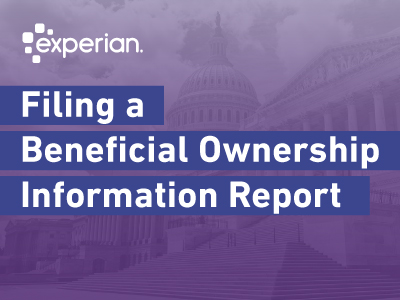Latest Posts
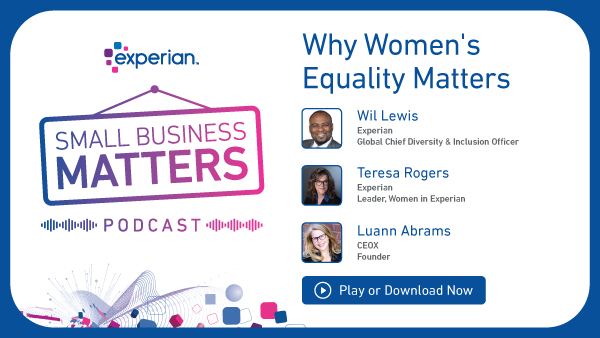
We're talking about Women's Equality on the podcast this week in the lead-up to Women's Equality Day taking place on Friday, August 26th.
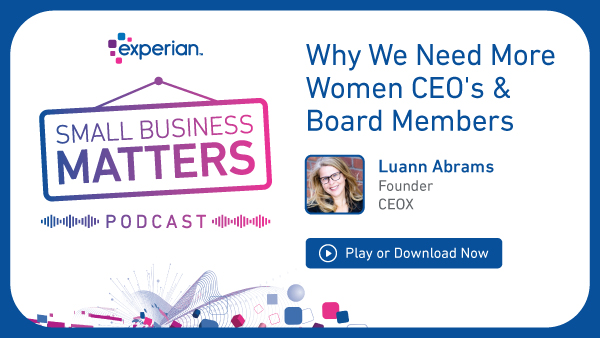
In this episode of Small Business Matters, we talk about women's equality with Luann Abrams and increasing the number of women CEOs and board members.
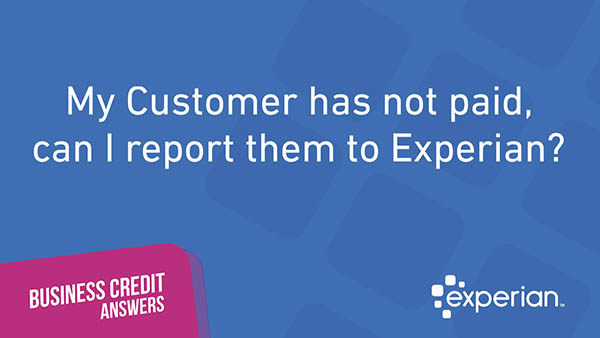
We get this question on the Small Business Matters blog quite often — "How can I report my customers' data to credit bureaus like Experian?” Many small business owners have questions about how to report data to credit bureaus as a business. So we invited Robbin Miske-Palmer from our Data Sourcing team to explain how that works, and what you can do as a business owner to give your customers the credit they deserve. Full File Reporting Many small businesses misunderstand that Experian requires reporting on all customer accounts, not just individual delinquent customers. This "full file reporting" benefits both businesses and their customers. Benefits for Businesses Improved Customer Creditworthiness: Reporting positive payment history helps customers qualify for better credit terms, encouraging their growth and potential spending with your business. Early Detection of Delinquency: Monthly reporting automatically reflects late payments, enabling early intervention to resolve issues and potentially avoid bad debt. Enhanced Vendor Reputation: Reporting demonstrates responsible credit management, fostering trust with other businesses and potential partners. Benefits for Customers Accurate Credit Reports: Reporting ensures accurate credit reports, reflecting good payment habits and contributing to higher credit scores. Access to Credit Opportunities: Positive credit history facilitates access to trade credit, loans, and other financial resources necessary for business growth. Encouragement of Responsible Credit Management: Reporting incentivizes customers to maintain good credit standing, benefiting their overall financial health. Getting Started with Experian Reporting Reporting business data to Experian is free, but requires meeting certain criteria: Membership Approval: Businesses need to apply and agree to Experian's terms and conditions. Monthly Full File Reporting: Timely submission of encrypted data files containing information on all customer accounts is mandatory. Standardized Format: Data files must follow a consistent format every month, simplifying the reporting process. Additional Resources Visit our website for detailed instructions and information on Experian business data reporting. Note that this is specific to reporting on businesses, not individuals. Reporting your customer's business data to Experian offers significant advantages for both your business and your customers. By facilitating responsible credit management and ensuring accurate credit information, this practice fosters a healthy business environment for everyone involved. Links: How to Report to Credit Bureaus as a Business Reporting your customers' business data is free but does require credentialing (Membership) approval. Click here to find information on reporting client/customer data to Experian. Please have ready the following information when you contact Experian - legal company name, business phone number, company address, contact email address, and estimate on the number of businesses to be reported. Note: this is for reporting businesses only, not individuals. If you need to know how to report consumer data to Experian, click here. The following is a lightly-edited transcript of our interview. Gary: And so Robin could you tell us a little bit about what you do here at Experian? Robbin: I'm in the data sourcing department and one of our main objectives is to help businesses onboard to Experian, to be able to report their data, their business data to Experian. Gary: One of the questions I wanted to ask you and what we get asked about a lot on our blog and on social media, is from small business owners and that is how to report data to credit bureaus as a business. And, one to one, I think there may be some misconceptions about how Experian handles that, and I was wondering if you had any feedback on that question that we could help them with. Robbin: Absolutely. So typically, we'll be contacted by a business looking to report just one particular tradeline. But for reporting business data to Experian, it is a full file reporting. And what that means is that you report on all of your accounts. So, with those good accounts, you report those, delinquent, slow pay. And the reason that you do that versus one particular account is that all of your businesses get the advantage of being reported. Robbin: So, if you are a small business, having your vendors report on you does affect your credit report. So, if you're paying as agreed, we want to certainly get that information on the credit report, so you can help those businesses that you work with. And, if you have to look at your slow-paying customers, you certainly want to be able to catch them sooner than later. So being able to report that full file, once they become delinquent you have that opportunity to speak with them and get them back on track since this is going to be something that's shared with the credit bureau. Gary: So, if they're reporting in an automatic way, let's say on a monthly basis to Experian, that transaction that shows the original invoice going out and the fact that it's 90 days or 60 days past due, that's automatically being reflected then in the data. Am I right? Robbin: Yes. Gary: And if the business owner at that point they want to get paid is it then up to commercial collections to go out and get that payment made? Robbin: They can certainly use those services, and Experian does accept collections data as well as trade data, but they also have the opportunity to discuss with their clients to say, "Hey, we do report this information to Experian, we want to be good stewards of your information, make sure that information gets to the credit report." Gary: What I got from your last statement was that with the full file reporting, that you know there are positives and negatives too for the business owner. The customers of your business are getting the credit that they deserve, right? Because you know, if they're paying you on time that's then being reflected in their business credit score. Robbin: Absolutely, and it's a benefit to the vendor to report that information because as their customers grow, and are able to access trade or other means of credit, they're able to grow. So, you certainly want to encourage their growth so that they can spend more with your vendor. Gary: Okay. Excellent. So now, if I'm a business owner, and I have not been reporting to Experian as yet, but I want to. What's their course of action, how do they start? Robbin: It's free to report business data to Experian, but we do have some guidelines that we have to meet. So, they do have to be a customer of Experian, which means there's an application and an agreement that must be signed. It is a monthly data reporting of that full file. You must be able to commit to sending that data to us in an encrypted fashion. And we have the tools already built to be able to do that. We just need your commitment that you're going to send the layout, format, and file, once a month. That layout format stays the same each month. Certainly, you're going to be adding customers, or somebody gets to a final status like they have paid in full, or they're no longer a customer you can report them through that final status, but it should be a monthly reporting that comes to us every month the format and layout stays the same. Gary: Excellent. Well, I want to thank you very much for taking time out today to talk to us about this Robbin and look forward to another opportunity to chat about data with you.

Business identity theft is on the rise. Here's how to protect your business.
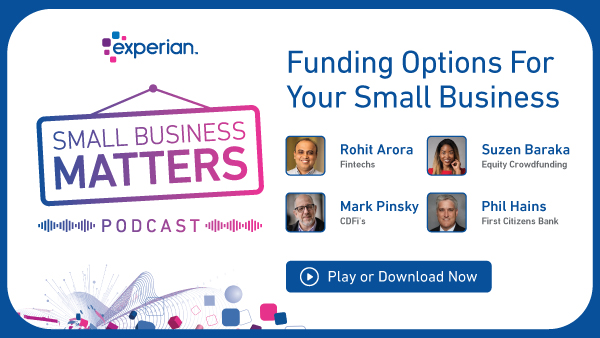
We explore different small business financing options on the podcast this week, from FinTech to CDFI, to Equity Crowd Fund and traditional banking.
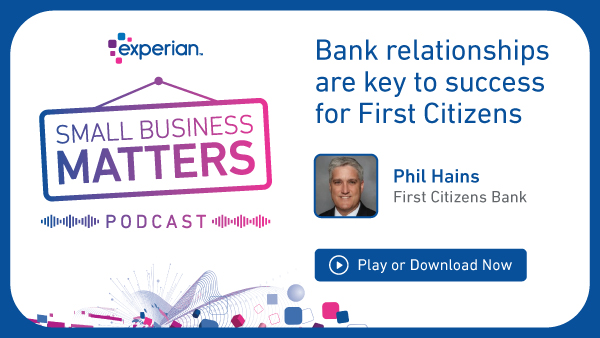
Experian is delighted to interview Phil Hains from First Citizens Bank for the Small Business Matters podcast this week to talk about small business finance.
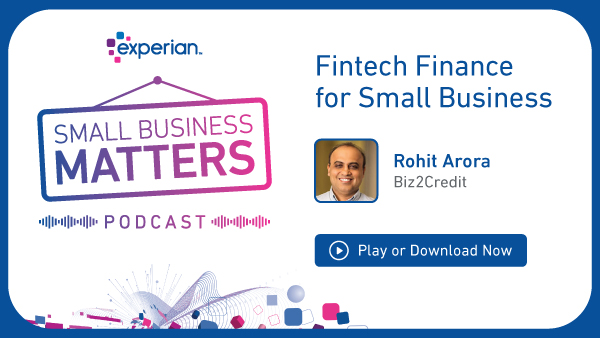
Rohit Arora is one of the country's leading experts in small business finance. His company, Biz2Credit, uses technology to streamline business funding.

CDFI Friendly America is on a mission to grow the number of CDFI's and make serious inroads into major U.S. cities. We spoke with Mark Pinsky about it.
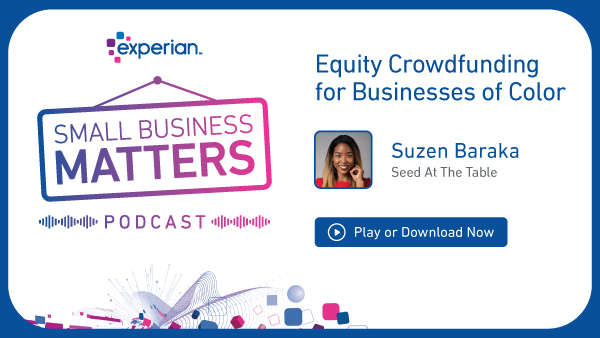
Seed At The Table is a mission-driven, equity crowdfunding platform committed to connecting diverse entrepreneurs with non-accredited investors looking to obtain equity or debt exposure at modest investment amounts. Emily Garman spoke with Suzen Baraka, Seed's Chief Administrative Officer to learn how they are working with small businesses.
